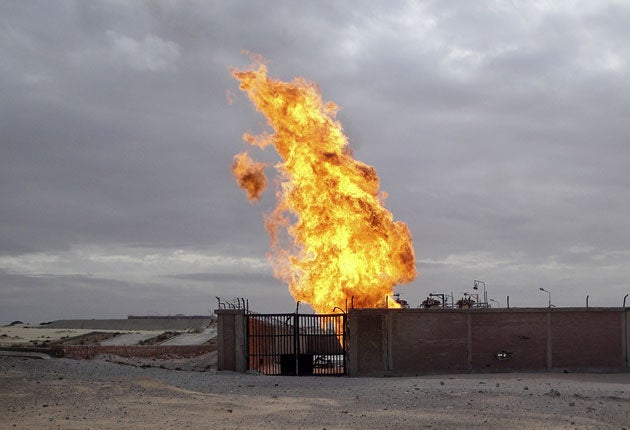All eyes on the Suez Canal as bomb shuts gas pipeline

Your support helps us to tell the story
From reproductive rights to climate change to Big Tech, The Independent is on the ground when the story is developing. Whether it's investigating the financials of Elon Musk's pro-Trump PAC or producing our latest documentary, 'The A Word', which shines a light on the American women fighting for reproductive rights, we know how important it is to parse out the facts from the messaging.
At such a critical moment in US history, we need reporters on the ground. Your donation allows us to keep sending journalists to speak to both sides of the story.
The Independent is trusted by Americans across the entire political spectrum. And unlike many other quality news outlets, we choose not to lock Americans out of our reporting and analysis with paywalls. We believe quality journalism should be available to everyone, paid for by those who can afford it.
Your support makes all the difference.Government officials yesterday claimed that life in Cairo was returning to normal, after two weeks of action that has paralysed the city. State TV said that banks and courts would reopen today, the start of Egypt's working week, though daily bank withdrawals would be limited to $15,000 and the stock market would remain shut, at least until after tomorrow.
Jitters about the impact of the unrest on the economy of both Egypt and the region were not eased yesterday when an explosion ripped through a gas terminal in Egypt's northern Sinai Peninsula, setting off a massive fire that was contained by shutting off the flow of gas to neighbouring Jordan and Israel. Supplies are expected to be hit for at least a week. While Israel has other sources of power, and Jordan is believed to have substantial reserves, the sense that Egypt's fragility can reach beyond its borders will add to the anxieties.
Traders are worried that the unrest might spread to oil-producing countries in the region and even affect shipments through the Suez Canal. Egypt is not a major oil producer, but it controls the canal and a nearby pipeline. Together these carry about two million barrels of oil a day from the Middle East to customers in Europe and the United States. Several large Egyptian refineries near the canal have been the site of recent protests.
So far, traffic through the canal has been unimpeded, but it is high on people's worry list. "I think the major fear regarding the canal revolves around the power vacuum being created by this uprising," said Jeff Sica, president of Sica Wealth Management in New Jersey. "The prospect for the canal being controlled by an unfriendly regime would further devastate the economy."
The likelihood of the canal being shut or blockaded seems remote. Still, it is a huge source of revenue for Egypt that the government will not want to lose, no matter who is in charge. But even the possibility could spook financial markets if tensions were to escalate.
Join our commenting forum
Join thought-provoking conversations, follow other Independent readers and see their replies
Comments